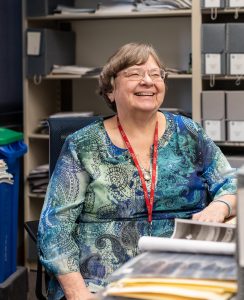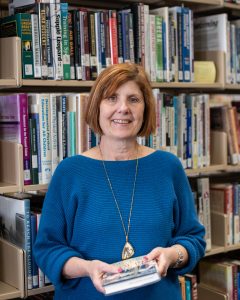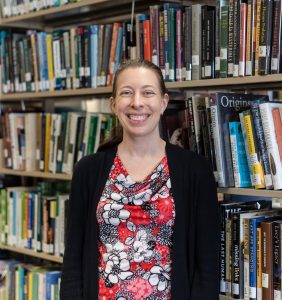Avery Gott
Staff Reporter
You see them every time you retreat to the library to study. They help you find books or information for your last-minute research projects. But, how well do you really know the college’s librarians? Three women working in the library shared their stories with us.
Anita Gordon-Gilmore
Her office is tucked down a hallway on the third floor inside the archives. Rows of tall shelves holding hundreds of gray filing boxes fill the room. Looming stacks of old archives are visible from the main corridor. It’s easy to miss the archivist among the files; she spends her days sifting through them, piecing together stories from the documents.
“I’m a librarian working as an archivist,” Anita Gordon-Gilmore, librarian, said. “I stayed on with the archives when they were just getting established.”
She began her career as a cataloger before the digital age streamlined the process. Gordon-Gilmore has a wealth of knowledge about the analog processes, but she said she doesn’t quite miss it.
“When I started out, we used to type what we called the main entry card, then we’d send it to another group [who] would copy it, then they’d send it on to typing, then they would alphabetize those and file them in the catalog,” Gordon-Gilmore said. “With a lot of human error going into it, things often got misfiled.”
Now, new library technologies have improved the cataloging process.
“I think it has developed a lot and, of course, the new technologies coming in have helped,” Gordon-Gilmore said. “Technologies help a lot with storing and retrieval.”
As an archivist, part of her position is inventing the aids to accurately locate information in the archive.
“We do a lot of tool creation,” Gordon-Gilmore said. “In putting things away, we often create tools such as timelines, names of people and even abbreviations we commonly used.”
To fill the holes in the stories of objects, archivists have begun the Sleuthing Series, a periodic release of archived photographs intended to crowd source information from people who might be able to identify those in the photos.
The archives hold the history of our campus, Gordon-Gilmore said. She stressed the importance of storing information for future generations to look back at the path the college has taken.
Gordon-Gilmore said, “People did not always know how important little things are to tell their story. We try to collect the things that are going to tell the story.”
Janet Brooks
A mid-life crisis and the demise of a business led Janet Brooks to her role as a college librarian 14 years ago.
“I had a first career where I worked at a specialty food shop for 15 years,” Brooks said. “We closed our doors. I went back to school. And, in the process of going back to school I decided I needed a part time job and I landed a job here at the information desk.”
Brooks graduated with a Masters of Library Science in 2009, and now fills a specialized role in interlibrary loan at the Billington Library. The program allows patrons to request materials from libraries they wouldn’t otherwise have access to.
“Resource sharing has been an interest to me from day one,” Brooks said. “I can offer our patrons a good deal of things that we just don’t have the funds or the space for.”
Brooks also teaches classes and works in collection development, particularly in the children’s department, used primarily by the children’s literature class on campus. Children’s books have evolved over the last five years to cover topics previously absent from the genre, Brooks said
“I see a lot of diversity in children’s books that wasn’t there five years ago. A lot of authors are stressing kindness. There are more books about the kinds of things children find themselves in,” Brooks said. “I see children’s literature becoming a little bit more relevant to the lives children are leading.”
The library has also developed over the course of Brook’s career, however, Brooks said she doesn’t hold on to nostalgia for the old library. Libraries are becoming epicenters for community engagement and education, and she said she is optimistic about the role of libraries in the future.
“I’m looking forward to how libraries are transforming themselves,” Brooks said. “They
are really the center of community, where the community comes to be involved.”
Libraries, Brooks said, will always need to fill both a need for print and online resources. Less commonly considered, however, is the respite libraries offered to their users. Brooks said this is the most important aspect of the character of the library.
“You need to be able to sit in a nook in a beautiful window and look out,” Brooks said. “You need to not only provide materials, but you need to provide space to enjoy them, and a place to linger.”
Jessica Tipton
Librarians are not just keepers of the books. At the college, librarians are also faculty and are constantly teaching, Jessica Tipton, associate professor and librarian said.
“We have all sorts of classes come in for one day sessions and we talk how to get started with research and different strategies with research,” Tipton said. “We try not to just give someone the answer. We try to show them how to get to the answer and empower them to get to the answer on their own.”
Tipton has a long list of responsibilities in the communications division of the library, including foreign languages and the interpreter training program. She is also in charge of DVD collection, numbering about 6,000.
In addition to her collection specialties, she has a hand in learning in the digital age. On her sabbatical, she studied how to better serve online students.
“How do we better support their research needs?” Tipton said. “I created a Youtube channel for us and I’m working on creating other tutorials that students can use on how to do research.”
The transition to online learning and resources is something Tipton said she looks forward to, though the role of the library in the google era can get murky. The relevance of libraries may no longer lie in storing information, she said. Rather, the library is now a tool to learn how to judge the reliability of information.
“You have to think about what’s the bias in this, who is the author, what’s their background, and whether they’re an expert or not an expert,” Tipton said. “There’s a lot of interesting information out there but you have to look at it from a critical viewpoint.”
Though some may feel nostalgia for the old role of the library, Tipton said she enjoys the speed digital researching provides.
“Maybe there’s a little bit of joy in like the hunt for some people,” Tipton said. “I don’t really miss the card catalog. I can find information faster now than I ever could.”
However, she said she embraces the multi- purpose nature of the 21st century library which must stretch to accommodate all needs.
“Everyone has different learning styles everyone has different learning abilities,” Tipton said. “We’ll always have print, we’ll always have online and we need to do a great job with both.”
Demands on libraries may have shifted dramatically in the last decade, but the central service of being a librarian hasn’t changed at all.
“I love my job because I get to learn something everyday,” Tipton said. “I get to help people and make a difference in their lives, so that’s why I love being a librarian.”
This story was featured in the 50th Anniversary edition.
























